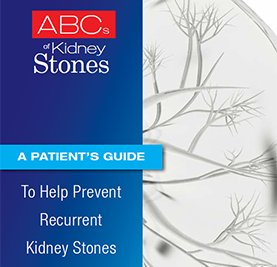- Home
- Preventing Kidney Stones
- Fluids
Fluids
What do fluids have to do with kidney stones?
Drinking a lot of fluids helps to dilute the urine so that substances such as calcium and uric acid do not become too concentrated and form crystals that can develop into kidney stones.
How much fluid should I drink every day?
This can vary from one person to another, but a general guideline is to drink at least 100 ounces of fluids daily. That’s equivalent to 10 glasses, 10 ounces each, distributed throughout the day. This may sound like a lot, but it’s really not. And it’s one of the most important things you can do for your kidneys.
What kinds of fluids should I drink?
Water is best, but you can also drink fruit juices, milk, and low-sugar/low-calorie beverages (especially if weight is a concern). Consuming a lot of high-sugar beverages should be avoided because too much dietary sugar has been linked to excess calcium in the urine. Alcohol in excess is also not recommended because it may cause dehydration.
Whatever you choose to drink, just do it! The key to preventing kidney stones is fluids, fluids, and more fluids.
What if I don’t feel thirsty?
Don’t wait until you feel thirsty to drink fluids. By that time, you have already been without them for too long. Get in the habit of always having fluids with you. And be sure to eat foods that are high in fluids. These can include fruits, vegetables, and low-salt soups.
Daily tips for increasing your fluids
- Carry a special water bottle with you at all times
- Set an alarm clock on your desk to remind you when to drink fluids
- Drink a glass of water before going to bed
- Keep a 24-hour diary to record when you drink fluids
- Set a goal for how many ounces you want to drink per hour and try to reach it
- Drink a glass of water before and after every meal
This information is intended to augment, not replace, the advice of your doctor. If you have any questions about this content, please talk to your doctor.


